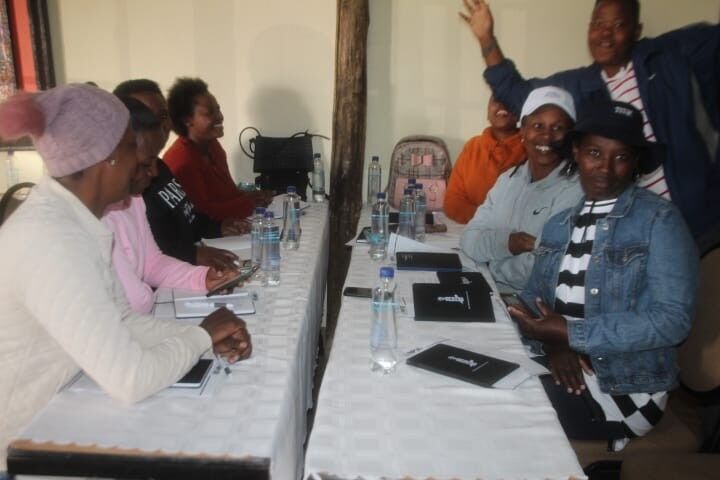SANPUD Empowering People Who Use Drugs Through Community Networks
Written by: Phumlani Malinga Save to Instapaper
The South African Network of People Who Use Drugs (SANPUD) is making significant strides in empowering people who use drugs by establishing local networks that advocate for their human rights. Unlike many organisations focused solely on rehabilitation, SANPUD’s putting people first approach recognises the importance of supporting drug users in a more holistic manner, particularly in advocating for their rights and combating the discrimination they face.
Recently, SANPUD conducted governance training workshops in QwaQwa on March 13th and 14th and in Amajuba district on March 15th and 16th. These workshops aimed to establish networks of people who use drugs in both areas. The main objective was to prepare these networks to effectively advocate for the needs of people who use drugs. As a result, four networks were established in two provinces: two in QwaQwa, namely the Lusaka PWUD Network and the Phuthaditjhaba PWUD Network in the Free State. Madadeni PWUD network & Osizweni PWUD network in KwaZulu Natal. Each network received a tablet to facilitate communication and further their advocacy efforts.
The governance training workshops were led by Charne Roberts, with support from Lucky Ndlovu and Klaas Mtshweni. Twenty people who use drugs (PWUDs) attended the training in each district. This was a critical first step in empowering these individuals to form networks that will work towards promoting and protecting their human rights.
A Personal Eye-Opening Experience
“As someone who had little prior knowledge of networks like SANPUD, the workshops provided invaluable insights into the discrimination and judgment faced by people who use drugs. Too often, they are denied access to essential government services that are their right as citizens. Worse still, they are frequently blamed for crimes they did not commit solely based on their appearance and status as drug users.”
Building Strong and Effective Networks
Through these workshops, participants learned essential skills for establishing and managing their own networks. This includes defining the vision and mission of the network, identifying the challenges that people who use drugs encounter, and devising actionable solutions to alleviate these problems. A network’s success hinges on the presence of effective leadership—leaders who possess qualities beneficial to the network—and a committed group of skilled members who can drive the network’s growth.
One crucial element touched on during the training is the importance of funding. Every network requires financial resources to operate and achieve its goals. Managing these funds responsibly is essential, and this involves creating and adhering to a budget. Proper budget allocation ensures that various parts of the network receive the necessary funding without overspending, thereby maintaining a sustainable operation.
Changing Perceptions and Advocating for Rights
The work of SANPUD is particularly important in changing the negative perceptions associated with drug use. By empowering those who use drugs to advocate for their own rights, SANPUD is fostering a sense of dignity and self-worth among a group that is often marginalized. This is not just about giving them a voice but ensuring that their voices are heard in discussions about their lives and their futures.
Moving Towards a National Network
The ultimate goal of SANPUD’s efforts is to create a national network comprised of these local nodes. This network will give people who use drugs a strong and powerful platform to ensure their involvement in policy discussions and decision-making processes that affect their lives. By doing so, SANPUD is laying the groundwork for substantial and long-lasting changes in how society views and treats people who use drugs.
Conclusion
In conclusion, SANPUD is doing remarkable work by empowering people who use drugs to establish local networks and advocate for their rights. Through governance training and resource provision, SANPUD is helping to combat stigma, advocate for systemic changes, and ultimately improve the lives of people who use drugs. As more people become aware of and support these initiatives, we can hope for a future where the rights of all individuals, regardless of their drug use status, are protected and respected.
Get new press articles by email
A media specialist for drug policy advocacy networks that work to protect and promote the human rights of people who use drugs.
Latest from
- SANPUD Seeks Strategic Leaders to Join Peer-led Board
- How Criminalisation, Rights Erosion and Regulatory Gaps Fuel Deaths in Unregistered Rehab Centres
- Beyond Condemnation - Poverty, Alcohol and Childhood Substance Exposure in SA
- Peer-Led Action Must Be Central to South Africa’s Hepatitis Response
- Turning Airwaves into Action - Using Radio Interviews to Drive HIV Advocacy
- Nina Manzi Wellness Day taking place at the Bellhaven Harm Reduction Centre in Greyville
- SANPUD Ensures Voices of People Who Use Drugs (PWUD) Shape Drug Policy, Sustainable Funding and Research
- Funding Disruption for HIV and Harm Reduction Services Will Cost Lives So South Africa Must Rethink Our Priorities
- Empowering Nurses for Compassionate Care - Join the Online Workshop on the Pregnancy and Substance Use Toolkit
- Meaningful engagement between funders and beneficiaries charts a real path to progress
- SANPUD hosts Groundbreaking Interpol Training on GBV and Harm Reduction
- SANPUD's Advocacy for Inclusive Open Clinics Through Community-Led Monitoring
- Community-Led Monitoring Leads to Empilisweni Clinic's Inaugural PWUD Open Day
- Public Event Promoting Healthcare Services Integration at local level to increase coverage of people from marginalised populations
- The Importance of Informed Decision-Makers in Harm Reduction
The Pulse Latest Articles
- Opinion Piece: Activating Leadership To Engage The Passive Workforce (February 11, 2026)
- Tchagra Trail Wilderness Consulting Launches A New Safari Experience In Photography And Tracking (February 9, 2026)
- Magic: The Gathering Releases Lorwyn Eclipsed (February 6, 2026)
- Back To Work, Back To Balance: Rethinking The 3pm Slump (February 5, 2026)
- Back-to-school Lunchboxes That Just Make Sense (February 5, 2026)
